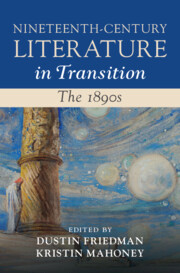Book contents
- Nineteenth-Century Literature in Transition: The 1890s
- Nineteenth-Century Literature in Transition
- Nineteenth-Century Literature in Transition: The 1890s
- Copyright page
- Contents
- Figures
- Contributors
- Acknowledgments
- Introduction
- Chapter 1 Race and Empire in the 1890s
- Chapter 2 Island Dandies, Transpacific Decadence, and the Politics of Style
- Chapter 3 The 1890s and East Asia: Toward a Critical Cosmopolitanism
- Chapter 4 Indulekha, or The Many Lives of Realism at the Fin de Siècle
- Chapter 5 Reading World Religions in the 1890s
- Chapter 6 Night Lights: The 1890s Nocturne
- Chapter 7 The Green 1890s:
- Chapter 8 “Only Nature Is a Thing Unreal”: The Anthropocene 1890s
- Chapter 9 Weird Ecologies and the Limits of Environmentalism
- Chapter 10 Queer Theories of the 1890s
- Chapter 11 Eugenics and Degeneration in Socialist-Feminist Novels of the Mid-1890s
- Chapter 12 The Conservative and Patriotic 1890s
- Chapter 13 Decadence and the Antitheatrical Prejudice
- Chapter 14 Religion and Science in the 1890s
- Chapter 15 Little Magazines and/in Media History
- Chapter 16 Fin-de-Siècle Visuality (and Textuality) and the Digital Sphere
- Index
Chapter 5 - Reading World Religions in the 1890s
Published online by Cambridge University Press: 17 August 2023
- Nineteenth-Century Literature in Transition: The 1890s
- Nineteenth-Century Literature in Transition
- Nineteenth-Century Literature in Transition: The 1890s
- Copyright page
- Contents
- Figures
- Contributors
- Acknowledgments
- Introduction
- Chapter 1 Race and Empire in the 1890s
- Chapter 2 Island Dandies, Transpacific Decadence, and the Politics of Style
- Chapter 3 The 1890s and East Asia: Toward a Critical Cosmopolitanism
- Chapter 4 Indulekha, or The Many Lives of Realism at the Fin de Siècle
- Chapter 5 Reading World Religions in the 1890s
- Chapter 6 Night Lights: The 1890s Nocturne
- Chapter 7 The Green 1890s:
- Chapter 8 “Only Nature Is a Thing Unreal”: The Anthropocene 1890s
- Chapter 9 Weird Ecologies and the Limits of Environmentalism
- Chapter 10 Queer Theories of the 1890s
- Chapter 11 Eugenics and Degeneration in Socialist-Feminist Novels of the Mid-1890s
- Chapter 12 The Conservative and Patriotic 1890s
- Chapter 13 Decadence and the Antitheatrical Prejudice
- Chapter 14 Religion and Science in the 1890s
- Chapter 15 Little Magazines and/in Media History
- Chapter 16 Fin-de-Siècle Visuality (and Textuality) and the Digital Sphere
- Index
Summary
This chapter surveys the market for popular works on world religions that exploded in Britain during the 1890s. Critics have explored how scholars like the Oxford Sanskritist F. Max Müller laid the groundwork for religious studies in the twentieth century by mapping global religions onto a global hierarchy of languages and cultures. Such work tends to confirm our view of Orientalism as an extension of imperial power-knowledge. However, middle-class liberals, evangelical missionaries, and occult enthusiasts all had their own reasons for exploring the religions of the world. Their fascinations unfolded against the backdrop of imperial power but were seldom reducible to it. In addition, studying these publications can challenge our association of the “Naughty Nineties” with radicalism and subversion by showing the importance that middlebrow religious culture played in broadening religious horizons. Popular Victorian publications on Buddhism, Islam, Zoroastrianism, and Hinduism would lay the basis on which Anglo-American religious liberalism could flourish into the postwar period.
- Type
- Chapter
- Information
- Nineteenth-Century Literature in Transition: The 1890s , pp. 97 - 111Publisher: Cambridge University PressPrint publication year: 2023



